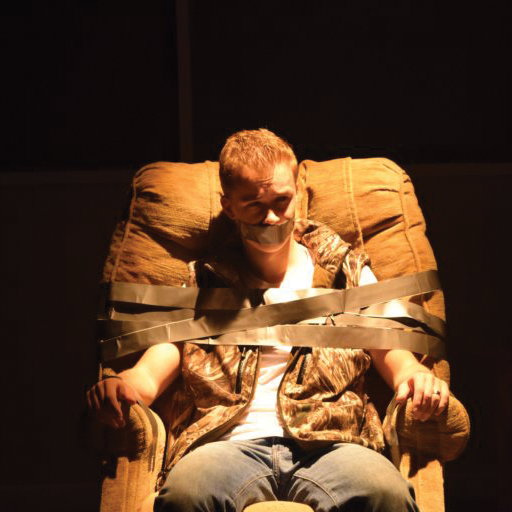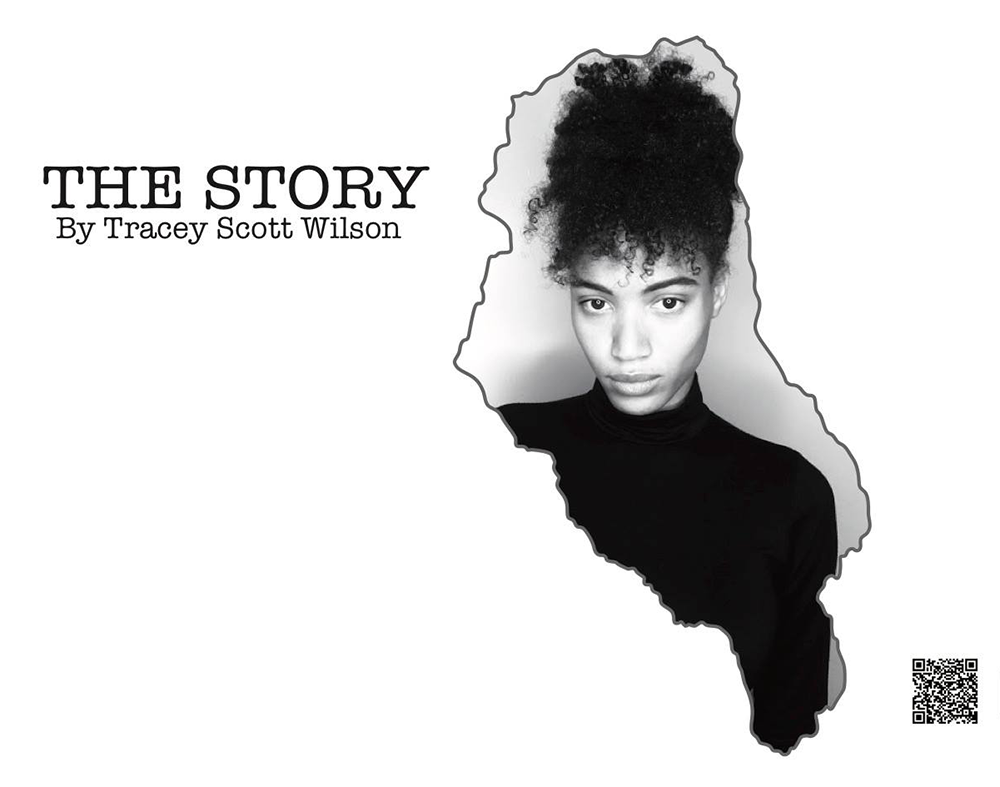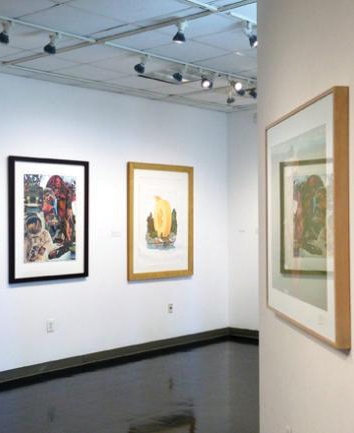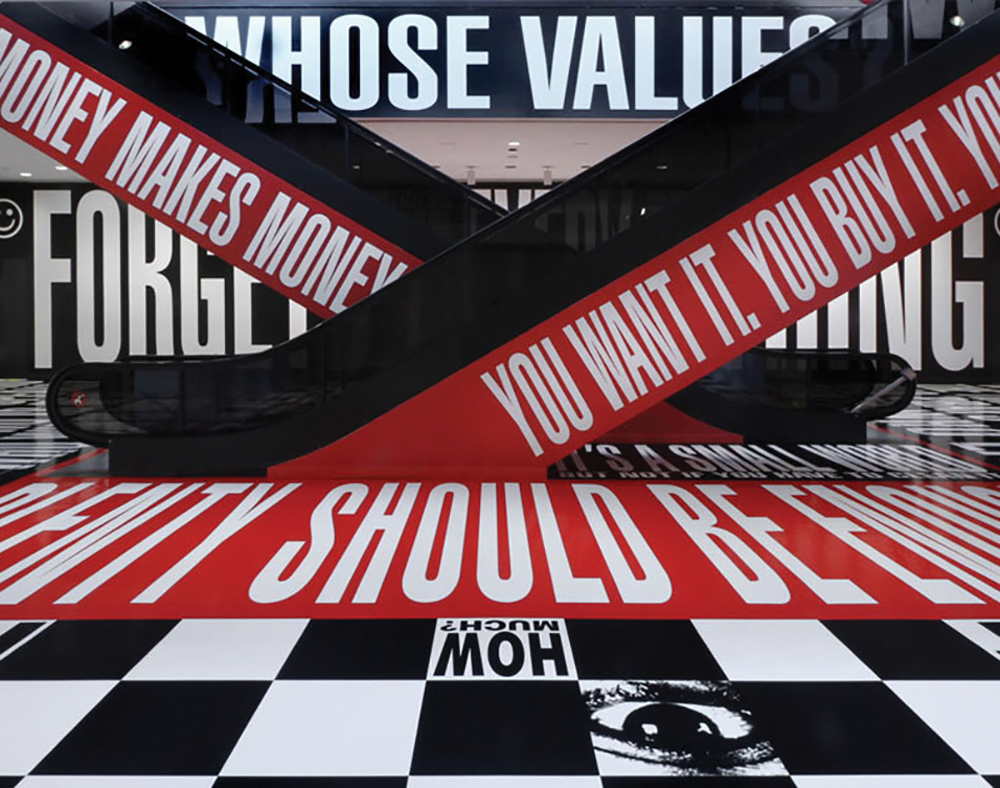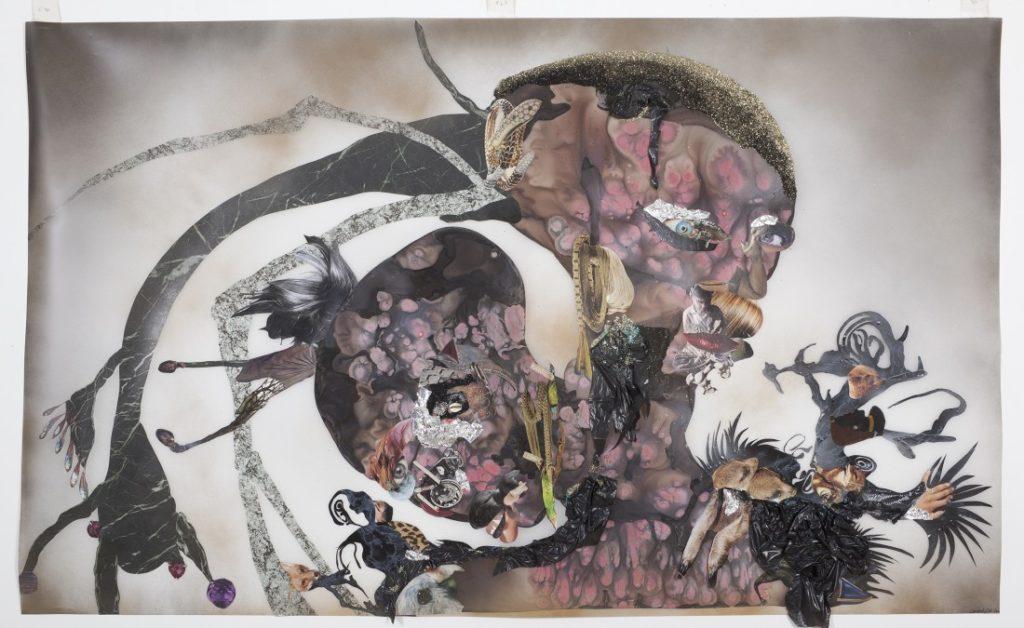A bare stage in Poulton Hall is shrouded in darkness. At once, a young man strolls out from stage right and begins speaking to the audience. He asks for someone to yell “Start the f—king play!” An audience member obliges, and at once, the stage is illuminated and a complex story of social and political tension unfolds.
Mask and Bauble Dramatic Society’s “Stupid F—king Bird,” staged in April 2017, is just one example of the hundreds of productions staged by Georgetown student theater groups over year. As a community that exists within the global epicenter of political dialogue, student theater groups at Georgetown University proudly engage in conversations about the current social and political landscape.
Reading the mission statements of student theater groups reveals a sect of campus passionate about art, politics and their point of intersection.
Theater is an art form particularly well-suited to spark conversations about social and political issues, in part due to the direct engagement between performer and audience.
Student actress Allison Lane (COL ’19) considers theater to be a tool for discussion and change. In October, she had a lead role in Nomadic Theatre’s fall production, “Exit, Pursued by a Bear,” which confronted the issue of domestic abuse.
“Every show I’ve ever done has left me feeling different,” Lane said. “Theater has that effect on audiences too by bringing to light things that normally wouldn’t be spoken about. It’s a way of sitting someone down in a chair and saying, ‘Here’s what’s going on. Now, it’s up to you.’”
Benny Weisman (COL ’19), a crewmember for “Exit, Pursued by a Bear,” similarly believes in the ability of theater to encourage stimulating conversation that is productive rather than argumentative.
“Theater prov
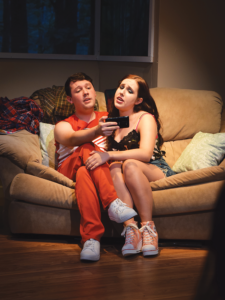
ides a way to discuss [issues] without the pressure that the debatelike environment of Georgetown has allowed,” Weisman said. “It’s a no-judgment zone.”
Given theater’s distinct ability to inspire discussion, some students feel that theatrical productions have a responsibility to address politics and social issues.
Alex Yurcaba (COL ’18), director of “Stupid F—ing Bird,” which touched on the subjects of fake news and social tension, said student theater has an obligation to confront political issues.
“Any student theater that doesn’t address politics is doing it incorrectly,” Yurcaba said. “We are really uninhibited by a lot of the social constraints that come with being a professional theater company. Students doing theater are afforded a lot of freedom — what you can say, what you are allowed to get away with. There is such a great opportunity to do challenging work and it’s a waste not to.”
For some students involved in the arts at Georgetown, performances and ideas are rooted in personal experience. Productions with strong political or social undertones are often charged by the values and beliefs held by the cast and crew. The Black Theatre Ensemble’s October production of “The Hand That Feeds You,” written and directed by Mackenzie Foy (COL ’19) and Kendell Long (COL ’19), confronted issues like police brutality and the importance of organizing against racial injustice, and was political and personal.
“I was coming out of a school year of really intense organizing work,” Foy said. “I learned a lot about myself, mostly, and how exhausted I get with certain things, especially with inactivism. I was having a lot of conversations with myself about what it means to be an activist and what organizing is. Having those questions inspired a lot of the questions in the play about the sustainability of activism.”
As co-founding director of the Laboratory for Global Performance and Politics a joint theater initiative between the theater and performance studies program and the Walsh School of Foreign Service, theater and performance studies professor Derek Goldman has engaged in extensive work to show how theatrical performance should be used as a tool to expose and discuss political issues.
Throughout his time as a professor in theater, Goldman has noticed this strong emphasis on personal experience as a source of inspiration for students. For him, observing the incorporation of individual emotion into theater is one of the many rewarding parts of working with and teaching student performers.
Goldman teaches “Improvisation for Social Change,” an introductory course offering an interactive laboratory for students to explore socially engaged improvisational performance in individual and group settings.
“‘Improvisation for Social Change’ is one of my favorite courses to teach, because what people are doing in that class is bringing the stuff that matters to them,” Goldman said. “There’s so much going on in their lives that it is easy to bring it in and surface it. Then, what we do is have artistic tools to explore what those issues are about. By extension, I think it’s gratifying to see the student theater groups taking those kinds of chances.”
When looking at recent student productions that confront issues as sensitive as police brutality or domestic violence, it is a constant challenge to perform thought-provoking scenes without causing extreme, overt shock in audience members..
Although it is important for a production to stir conversation, there is also a crucial difference between a show that is appropriately challenging and a show that is overwhelming for its performers or audience. For Foy and Long in “The Hand That Feeds Me,” achieving this balance was enormously important.
“I don’t want to put anyone in a position where they have to relive a violent situation or imagine that physically. I struggled a lot with what that would look like. It ended up being something really cool in part because I didn’t want anyone to hit somebody on stage in a police costume,” Foy said. “I didn’t want that for the person playing the police officer. I didn’t even want the audience to have to watch that.”
Similarly, in “Exit, Pursued By A Bear,” Lane worked diligently to present her character in a way that successfully portrayed the severity of domestic violence in order to respect all those who had lived through analogous experiences. Lane’s performance required meticulous character study, allowing her to internalize the emotional weight of abuse and translating that into a visual performance.
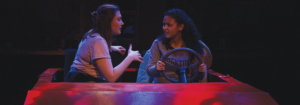
“I was mostly concerned with doing justice to people who have been in this situation and making sure that anyone who is really going through that experience could relate to the character and find themselves there,” Lane said. “That was my main concern — I wanted to make sure I wasn’t making light of a situation that really is so grave.”
Despite the challenges of addressing delicate issues on stage, the responsibility to do so is critical — now more than ever. In today’s turbulent political climate, dramatic performance serves as a platform for open and honest discussion.
Maya Roth, a theater and performance studies professor at Georgetown, sees a need for theater to serve as a means of engagement in today’s political and social landscape.
“We don’t have a lot of social spaces in the world and in the U.S. right now,” Roth said. “There used to be more public forums, but I think theater can create that. We are so fortunate to have dynamic spaces where you can reconfigure the spatial relationship and be in small spaces because that means the audience feels profoundly connected and part of the experience. It’s not just a personal story, but it has social implications.”
For Goldman, the chaos of politics today presents student theater with the opportunity to engage with important issues on an unparalleled level of depth.
“The paradox of these times is that there are so many desperate challenges from an unprecedented refugee crisis to climate challenges, to our national polarization and the way that old ghosts are resurfacing in terms of hate and intolerance,” Goldman said. “There’s so much wrong. But this is actually where the arts are at their strongest.”
The recent student productions at Georgetown have proven that the arts are indeed at their strongest. In a time that requires deep engagement with political and social discourse, student performers at Georgetown have risen to the occasion with courage. The conversations inspired by their productions will undoubtedly make waves in the Georgetown community and beyond.
“Realizing the conversation and questions that were stirred as a result of folks seeing the show was the most affirming feeling,” Long said. “The content and themes of the play do not end once everybody does their bows. It all continues.”


